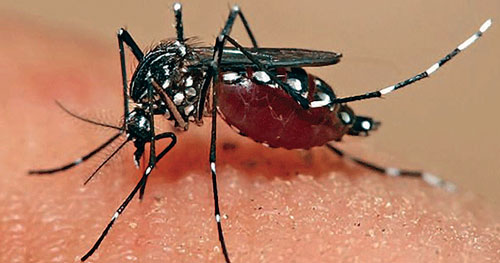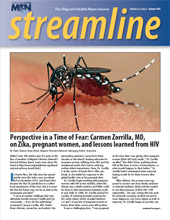Perspective in a Time of Fear: Carmen Zorrilla, MD, on Zika, pregnant women, and lessons learned from HIV
 By Claire Hutkins Seda, Writer, Migrant Clinicians Network, Managing Editor, Streamline
By Claire Hutkins Seda, Writer, Migrant Clinicians Network, Managing Editor, Streamline
[Editor’s note: This article is part of a series on the lives of members of Migrant Clinicians Network’s External Advisory Board. Learn more about the board at http://www.migrantclinician.org/about/external-advisory-board.html.]
In Puerto Rico, the Zika virus has spread quickly since the index case was identified in December 2015, and Puerto Rico became the first US jurisdiction to confirm local transmission of the virus. But is it possible that the future may not be as dark as the newspapers proclaim?
“I see it as another challenge that may ultimately benefit women’s health and my community — if we do the right thing,” envisioned Carmen Zorrilla, MD, Puerto Rican clinician, researcher, and activist. Her astounding optimism comes from three decades as the island’s leading advocate for pregnant women suffering from HIV, and the sensational results she’s had in reducing mother-infant transmission. Now, Dr. Zorrilla is at the center of Puerto Rico’s Zika outbreak, as she builds her response to the global health crisis at her prenatal clinic.
Dr. Zorrilla began working with pregnant women with HIV in the mid-80s, when the disease was a death sentence and little could be done to halt transmission between mother and child. In 1986, Dr. Zorrilla pushed for a policy of universal prenatal screening for the entire island, which revealed between 1.6 and 1.8 percent of pregnant women in Puerto Rican labor rooms were HIV-positive.
It was a challenging time. “I was pregnant at the time that I was giving other pregnant women [their HIV test] results,” Dr. Zorrilla recalled. “We didn’t know anything about HIV at the time, in terms of transmission, or what would happen to their babies.” Dr. Zorrilla hadn’t anticipated what universal testing would do for these women after birth.
“After delivery, the women were supposed to receive care from family medicine or internal medicine, [but] nobody wanted to see them because of their HIV. I felt responsible,” she said, noting that her push for universal screening resulted not just in more diagnoses, but more stigma as well. In response, Dr. Zorrilla began to provide care response, Dr. Zorrilla began to provide care to HIV-positive women after birth, “sort of like an underground clinic” within her prenatal clinic. Thirty years later, she is still seeing some of those first HIV patients. “Their kids are the same age as my daughter so there’s a personal relationship.”
Over the years, Dr. Zorrilla has further pushed the boundaries of her work with women by engaging in research as well. Early on, her small clinic, the Maternal Infant Studies Center (abbreviated in Spanish as CEMI, invoking the word for an indigenous deity) enrolled pregnant women in a clinical trial of the antiretroviral drug zidovudine (ZDV), then known as azidothymidine (AZT). The Pediatric AIDS Clinical Trials Group 076 enrolled 750 HIV-positive women from across the US to determine the effectiveness of the drug in reducing HIV transmission from mother to child. Dr. Zorrilla’s clinic was one of the first 10 clinical trial sites in the US. Halfway through the trial, however, the drug was found to be so effective that the trial was suspended for ethical reasons, to enable the women and babies on placebo to benefit from the drug as well.
One month after the study was halted, Dr. Zorrilla once again stepped into the policy arena to urge health authorities to establish a public policy of providing the drug without cost to pregnant women with HIV. Puerto Rico became the first US jurisdiction to implement such a policy. Dr. Zorrilla’s research and activism has been instrumental in flipping the outcomes for Puerto Rican babies of HIV-positive mothers. “The transmission from mother to infant has decreased dramatically in my clinic. The last baby who was born positive was in 2007,” Dr. Zorrilla proudly declared.
Dr. Zorrilla is continually interested in revamping her approach to attain better results for women and their babies. In the last four years, she has found success with Centering™, a group prenatal care program for high-risk patients that she adopted in the OB/GYN clinic in the hospital with which she works. Patients are accompanied by a partner or friend for the entirety of the session. To stay active in their own care, patients take their own blood pressure and weigh themselves. Then, they participate in a group discussion. “It’s not a support group or a class,” she clarified. “It’s a combination of games, conversation, learning from each other...We have curriculum, some topics we want to cover, but whatever issues are important to them, we will discuss.” The results in the first few years include fewer pre-term babies and higher birth weights. However, Dr. Zorrilla states “establishing and sustaining the [Centering] program has been a greater challenge than working with HIV” because of the difficulty in shifting the culture within the clinic. “There’s a lot of resistance from the staff” despite her earnest attempts to involve them at each step of implementation, she said. As with other innovations, interruption of workflow and standard processes had staff concerned over changes. Nonetheless, she continues to push the group discussion format because of its impressive results.
Over the span of her career thus far, Dr. Zorrilla facilitated a dramatic shift in the care for, perception of, and outcomes for pregnant women and their children, when it came to HIV. This transformation is exactly what shapes her perspectives on Zika — and her experiences in clinical care are driving her approach to handle Zika in pregnant women at her clinic in the midst of this latest outbreak.
“When we started talking about Zika and I started reviewing the information, I said, well, I need to do with patients with Zika what I already did with patients with HIV,” Dr. Zorrilla said. She has set up a group care visit for women with diagnoses of Zika. She’s also spearheaded a partnership with a local university’s Clinical Psychology Program to involve doctoral students of psychology at the clinic, and to help the patients manage “the stress, the anxiety, and the misinformation” that revolves around the virus, she said. Once again, she’s shifting the culture of the clinic. “Nowhere [else] are there psychology students rotating in a prenatal clinic,” she noted.
As of early June, Puerto Rico has reported about 339 pregnant women infected with Zika, out of roughly 2,387 cases overall. “But everything is just starting in Puerto Rico. We’re going to see babies affected, maybe at the end of the year,” she noted. Although parts of South America may have a break in new cases as they ease into the winter, the Caribbean “will continue to see infections, unless we do something.”
With HIV, “now I see no transmission, people are healthy. Out of nothing, we have very good treatment,” reflected Dr. Zorrilla. “So, I think this is my plea and my experience. If we have the desire, the political will, we will find a solution,” to the Zika virus.
Read this article in the Summer 2016 issue of Streamline here!
Sign up for our eNewsletter to receive bimonthly news from MCN, including announcements of the next Streamline.
Return to the Streamline Summer 2016 Table of Contents.
